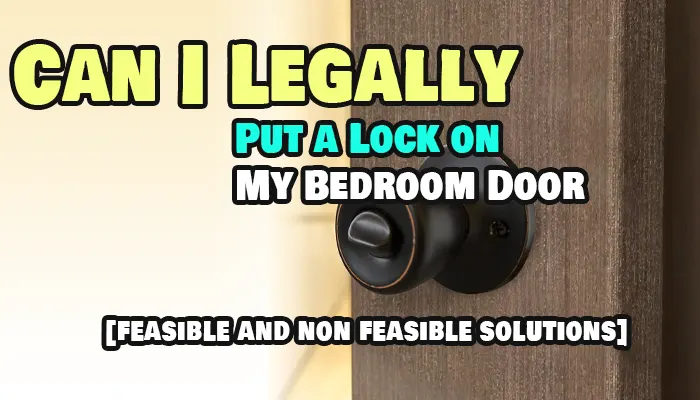When it comes to personal space and privacy, people often wonder:
Can one legally put a lock on their bedroom door?
This inquiry delves into the intricate balance between individual rights, legal implications, and the fundamental need for privacy within the confines of one’s home. Do bedrooms need privacy, and is it illegal to have a key lock on a bedroom door? These queries resonate with individuals seeking to safeguard their personal sanctuaries for various reasons.
Table of Contents
Where Installing a Bedroom Door Lock is Either Feasible or Not Feasible
When contemplating whether you can legally install a lock on your bedroom door, various factors come into play, influencing the feasibility and permissibility of such modifications. From ownership status to rental agreements, safety concerns, and the rights of cohabitants, navigating the legality of installing bedroom door locks requires careful consideration.
| Possibility | Scenarios |
|---|---|
| Feasible | – Homeownership: If you are the owner of a house, you can generally install a lock for security or privacy reasons. |
| – Leaseholder’s Liberty: Tenants often have the right to privacy and can install locks with landlord consent. | |
| – Security Prioritization: In high-crime areas or for personal safety, putting a lock is usually justified. | |
| – Mutual Agreement: If living with others, obtaining their consent is crucial to prevent misunderstandings. | |
| Not Possible | –Lease Restriction: Rental agreements may restrict lock installations without landlord approval. |
| – Fire Safety Compliance: Some regions prohibit locks on bedroom doors for quick evacuation during emergencies. | |
| – Child Safety Compliance: Building codes may forbid locks due to child safety considerations in the bedroom. |
Also Read: How To Lock Bedroom Door From Outside [5 Simple Ways]
Legal Considerations
In the legal consideration section, we explore three main areas that provide insight into this concern:
- Laws regarding privacy rights in residences.
- Building codes and regulations.
- Landlord and tenant agreements
Privacy Rights
In many jurisdictions, individuals possess a legal right to privacy within their homes, including their bedrooms. This right extends to the ability to control access to personal spaces, such as bedrooms, without undue interference from others. However, the specific legal protections afforded to bedroom privacy may vary depending on local laws and legal precedents.
Building Codes and Regulations
Building codes and regulations may dictate the types of locks and security measures permissible within residential properties. These codes often aim to balance the need for security with fire safety concerns and emergency egress requirements. As such, homeowners and tenants should ensure that any locks installed comply with applicable building codes to avoid potential legal ramifications.
Landlord and Tenant Agreements
For renters, the installation of locks on bedroom doors may be subject to the terms of their lease agreement or rental contract. Landlords typically retain certain rights to access rental properties for maintenance and inspection purposes. Therefore, tenants considering installing bedroom locks should review their lease agreements carefully and seek permission from their landlords if necessary to avoid breaching contractual obligations.
Also Read: How To Prevent Someone From Unlocking Your Bedroom Door[Solved]
The Need for Privacy in Bedrooms
As people navigate the complexities of modern relationships, two compelling reasons emerge for the desire to fortify bedroom boundaries with a lock.
- The need to keep unwanted individuals, particularly ex-partners, out of their room underscores a fundamental desire for autonomy and safety within one’s personal space.
- During periods of separation or impending divorce, the bedroom becomes a symbolic battleground where emotions and possessions intertwine, prompting them to seek means to safeguard their belongings and emotional well-being.
Conclusion
In conclusion, the question of whether one can legally install a lock on their bedroom door encompasses a myriad of legal, practical, and safety considerations. While homeowners generally enjoy the freedom to modify their living spaces, tenants must navigate lease agreements and landlord policies.
Safety concerns, both personal and regulatory, also play a significant role, with fire safety and child welfare regulations often dictating the permissibility of locks. Furthermore, the importance of open communication and mutual agreement in shared living arrangements cannot be overstated.
By understanding the nuances of these factors, individuals can make informed decisions regarding the installation of bedroom door locks, ensuring both compliance with the law and the protection of personal privacy and safety.
FAQ’s
Q.1 Can I install a lock on my bedroom door if I rent my home?
Ans: It depends on your lease agreement and the landlord’s policies. Many landlords permit tenants to install locks with prior consent, but violating lease terms could lead to eviction.
Q.2 Are there any safety regulations prohibiting bedroom door locks?
Ans: Yes, in some regions, fire safety regulations may prohibit locks that impede quick evacuation during emergencies. Always check local building codes for compliance.
Q.3 Do I need consent from everyone I live with to install a bedroom door lock?
Ans: Yes, obtaining consent from all parties, whether family members or roommates, is crucial to prevent misunderstandings and legal complications.
